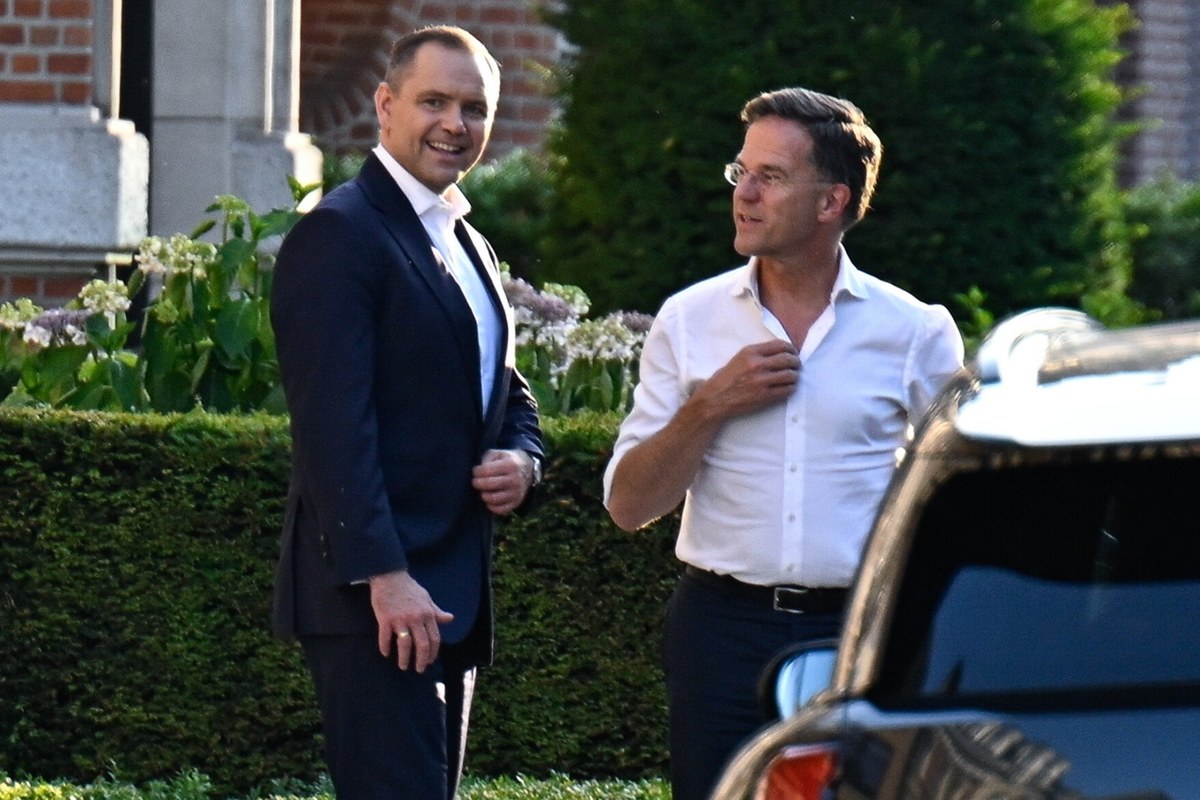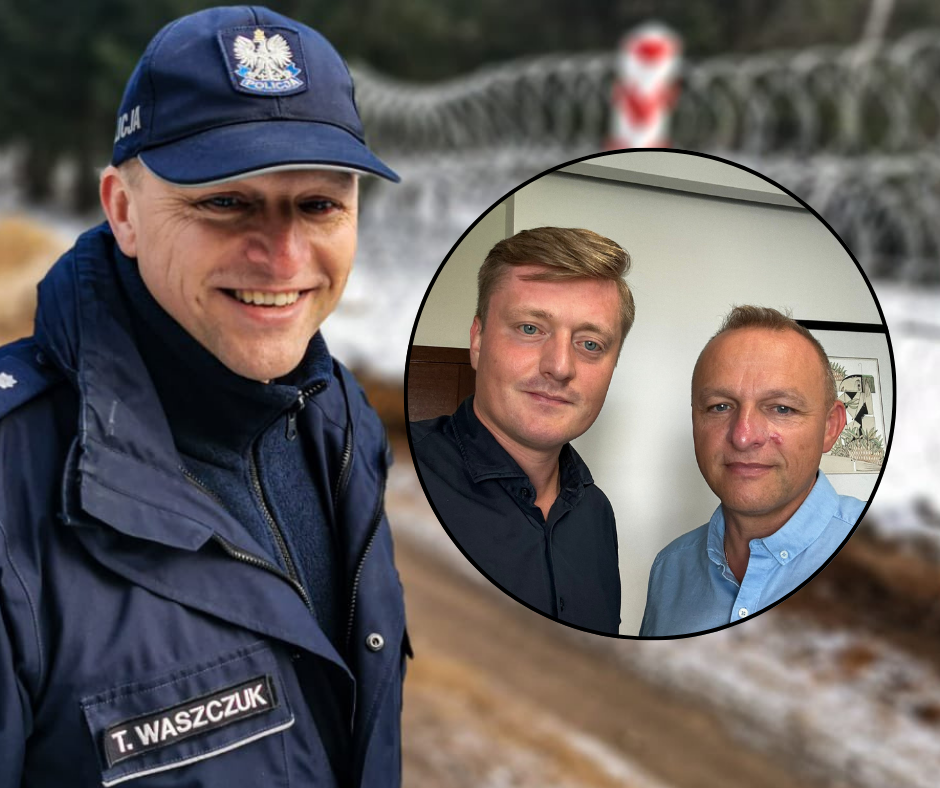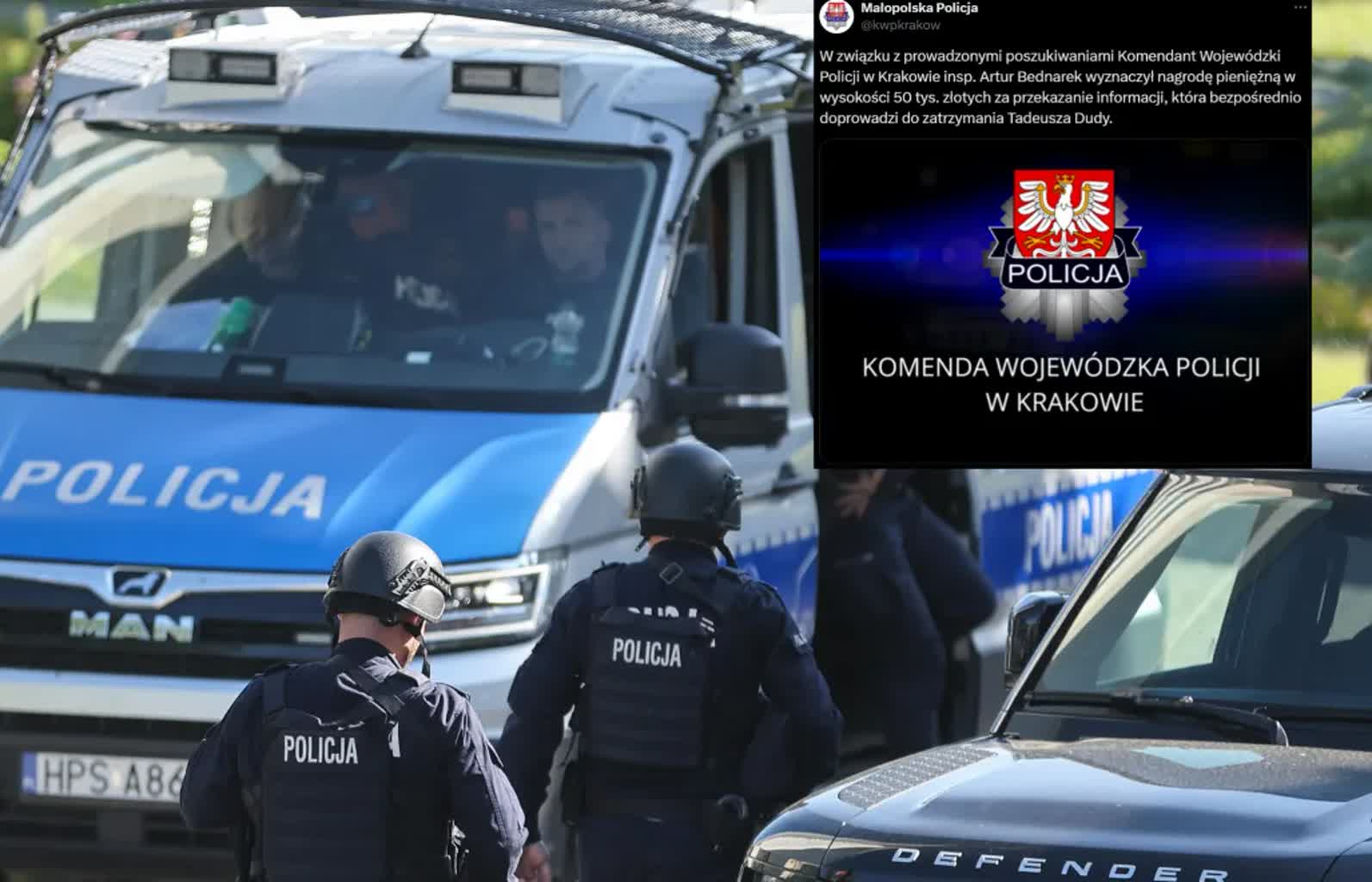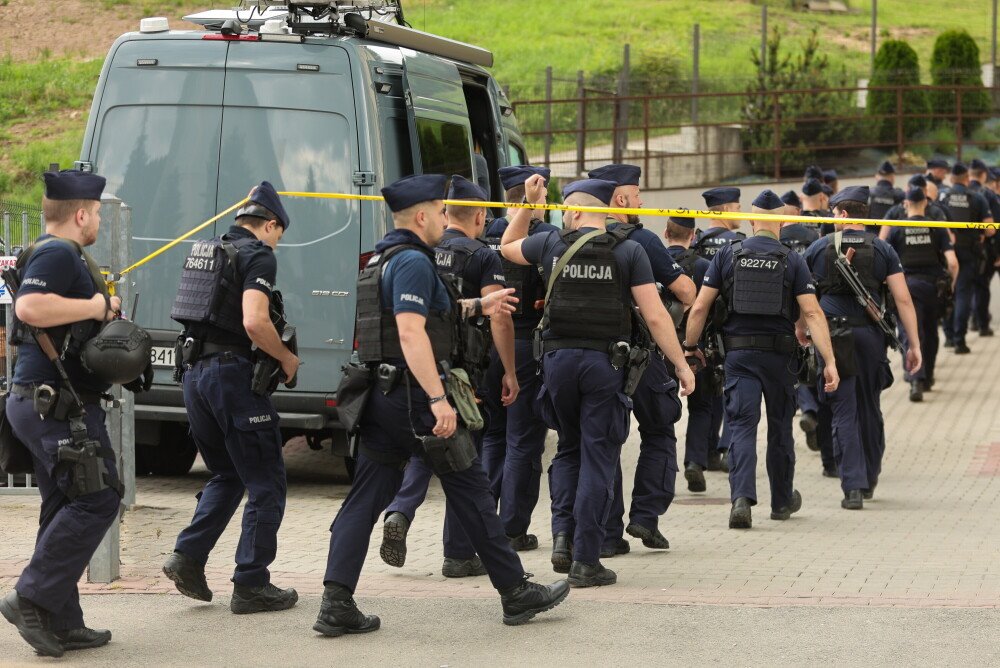reprint - 2016
"Gazeta Polska" DISCLAIMS: Safjan in Nazi uniform
During the Extraordinary legislature of Polish Judges, justice Marek Safjan described the 2 judges as “sad” by describing the past of their parents.
Maciej Marosz
Independent.PL
Filip Blazejowski/Gazeta Polska
During the Extraordinary legislature of Polish Judges, justice Marek Safjan described the 2 judges as “sad” by describing the past of their parents. Meanwhile, “Gazeta Polska” reached fresh papers concerning the past of the father of Safjan. He was not only an associate of Communist Military Information, but besides an officer of Nazi Grenzschutz, fighting the National Army.
Some of the facts described here have already been disclosed in the publications of prof. Andrzej Nowak, Maciej Replewicz or Joanna Siedlecka. However, the “Gazeta Polska” reached the papers found in the Central Military Archive, including Safjan's personnel file from his post-war service on the LWP's Chief Political Board.
In Grenzschutz as a volunteer
According to the documents, From 1943 to 1944 Zbigniew Safjan served in the uniform of Nazi police Grenzschutz, besides called “Zoll”. He volunteered. He then lived in the village of Rozana. The Germans arranged a judaic ghetto in this settlement of the Brest region. In 1942, they began its liquidation. They deported its inhabitants to a camp in Wołkowysk, where they were shortly taken to Treblinka gas chambers. More than 120 people were murdered in Rozana. Many were killed during the march to Volkovsk.
Różana and surrounding areas were an inflammatory region close the 3rd Reich border with Belarus. Safjan witnessed these dramatic events. He was wearing a Nazi uniform and a gun. His photograph was preserved in the uniform of the Nazi state police. Her troops were active in fighting anti-Hitler guerrillas.
According to the information she received in 1950, the Peerel Military Prosecutor's Office,
Filip Blazejowski/Gazeta Polska
During the Extraordinary legislature of Polish Judges, justice Marek Safjan described the 2 judges as “sad” by describing the past of their parents. Meanwhile, “Gazeta Polska” reached fresh papers concerning the past of the father of Safjan. He was not only an associate of Communist Military Information, but besides an officer of Nazi Grenzschutz, fighting the National Army.
Some of the facts described here have already been disclosed in the publications of prof. Andrzej Nowak, Maciej Replewicz or Joanna Siedlecka. However, the “Gazeta Polska” reached the papers found in the Central Military Archive, including Safjan's personnel file from his post-war service on the LWP's Chief Political Board.
In Grenzschutz as a volunteer
According to the documents, From 1943 to 1944 Zbigniew Safjan served in the uniform of Nazi police Grenzschutz, besides called “Zoll”. He volunteered. He then lived in the village of Rozana. The Germans arranged a judaic ghetto in this settlement of the Brest region. In 1942, they began its liquidation. They deported its inhabitants to a camp in Wołkowysk, where they were shortly taken to Treblinka gas chambers. More than 120 people were murdered in Rozana. Many were killed during the march to Volkovsk.
Różana and surrounding areas were an inflammatory region close the 3rd Reich border with Belarus. Safjan witnessed these dramatic events. He was wearing a Nazi uniform and a gun. His photograph was preserved in the uniform of the Nazi state police. Her troops were active in fighting anti-Hitler guerrillas.
According to the information she received in 1950, the Peerel Military Prosecutor's Office,
"Safjan erstwhile in a conflict with guerrillas specially distinguished himself, received praise from the military German authorities and was set as a model of a good soldier."
Shot by a tip from Safjana
With the formation of Safjana – the Grenzschutz police – the AK troops, among others, clashed. It was at the hands of these officers that Commander Tadeusz Zawadzki “Zośka” was killed in action in Sieczych. Safjan fled with the German army in 1944 erstwhile the russian army front moved west. In unexplained – besides by communist safety – Safjan's circumstances then crossed the front line and joined the Red Army. From there he went to the ranks of the Second Army of the WP.
After the war, he began to make a fast career and shortly became head of the propaganda department of the Chief Political Board. He was liable for the political training of soldiers and instilling Marxist-Leninian propaganda.
In 1945, Safjan filed a Russian study to Military Information for his fellow military officer. A 21-year-old AK soldier Jan Nessler was incorporated into the army commanded by General Karol Świerczewski. He confided in Safjan that he did not know whether to take an oath of allegiance to the creature led by Bolesław Bierut or to flee to the independency partisan.
Nessler was in fact convicted by a military court for his membership of the AK. He was accused of wanting to affect Safjan in his cooperation to keep the AK in contact with the civilian population. The conviction – the death punishment – was executed.
"Politically rather sure"
In the Safjan army, he rapidly deserved the flattering opinions of his superiors. His commanders stated that "he is an officer sincerely devoted to the origin of Democratic Poland". On the occasion of the application for promotion to Lieutenant, it was written in 1946 that he "worked politically eagerly, perfectly understood the political situation of the country, politically completely sure, democratic views".
Safjan was distinguished by the management of the GZP (the Chief Political Board of the Polish Army) for political awareness of the staff and the fight against "right-nationalist deviations". Due to the 32nd anniversary of the large Socialist Revolution of October, Major Safjan was awarded a cash bonus of PLN 6000. After a year he besides received specified a distinction. At that time, the head of political training of soldiers besides applied for vacation cards for his wife and kid at a military vacation center in Jurat.
Shot by a tip from Safjana
With the formation of Safjana – the Grenzschutz police – the AK troops, among others, clashed. It was at the hands of these officers that Commander Tadeusz Zawadzki “Zośka” was killed in action in Sieczych. Safjan fled with the German army in 1944 erstwhile the russian army front moved west. In unexplained – besides by communist safety – Safjan's circumstances then crossed the front line and joined the Red Army. From there he went to the ranks of the Second Army of the WP.
After the war, he began to make a fast career and shortly became head of the propaganda department of the Chief Political Board. He was liable for the political training of soldiers and instilling Marxist-Leninian propaganda.
In 1945, Safjan filed a Russian study to Military Information for his fellow military officer. A 21-year-old AK soldier Jan Nessler was incorporated into the army commanded by General Karol Świerczewski. He confided in Safjan that he did not know whether to take an oath of allegiance to the creature led by Bolesław Bierut or to flee to the independency partisan.
Nessler was in fact convicted by a military court for his membership of the AK. He was accused of wanting to affect Safjan in his cooperation to keep the AK in contact with the civilian population. The conviction – the death punishment – was executed.
"Politically rather sure"
In the Safjan army, he rapidly deserved the flattering opinions of his superiors. His commanders stated that "he is an officer sincerely devoted to the origin of Democratic Poland". On the occasion of the application for promotion to Lieutenant, it was written in 1946 that he "worked politically eagerly, perfectly understood the political situation of the country, politically completely sure, democratic views".
Safjan was distinguished by the management of the GZP (the Chief Political Board of the Polish Army) for political awareness of the staff and the fight against "right-nationalist deviations". Due to the 32nd anniversary of the large Socialist Revolution of October, Major Safjan was awarded a cash bonus of PLN 6000. After a year he besides received specified a distinction. At that time, the head of political training of soldiers besides applied for vacation cards for his wife and kid at a military vacation center in Jurat.
More than life
He hid his cooperation with the German occupier Safjan from communist power. However, erstwhile the full fact came out during the interrogation before being recruited by Military Information, Safjan admitted to lying in his résumé, concealing the fact of service in the Nazi formation.
In an investigation concerning his cooperation with the German occupier, he identified the names of another people who did a career in MBP ( Ministry of Public Security) after the war who served in Grenzschutz.
Although after Safjana's cooperation with the Nazis was revealed, he was removed from the army, demoted to a private and excluded from the party, this did not origin his public death. On the contrary, then a fresh phase of his large career opened as an influential figure of the Polish People's Republic, and later the 3rd Republic of Poland. In civilians he could proceed to work as a propagandist and proceed his journalistic work already begun in the military. He besides conducted literary activities, became the author of bestsellers specified as “Then there will be silence”, “To the blood of the last” or the banner ‘Stakes greater than life’,in which he created it as the "hero" of the PRL agent NKWD Hans Kloss.
In 1951, Safjan was recruited as a TW by Military Information, choosing ps. “Zeran”. In his commitment to co-operation, he stated that he was aware of the criminal work for the crimes committed by concealing from the military authorities the fact that he belonged to the organisation “Zoll” during the business and cooperation with Germany.
“I undertake to cooperate with the MON Information Authorities in revealing spies, diversions and another enemies of Democratic Poland and the Polish Army,” Safjan said.
After years of break, since 1967, he has acted again in the PZPR, being among others an activist of the Warsaw organization Committee. In the state of war he went to the Provisional Council of the National Patriotic National Rebirth Movement. He was besides in the national authorities of the Polish-Soviet relationship Society.
Marek Safjan: Father left our family
The boy of screenwriter Marek Safjan, erstwhile head of the Constitutional Court, stood in the first line of the rocoche justice against the regulation of the Law and Justice.
After years of break, since 1967, he has acted again in the PZPR, being among others an activist of the Warsaw organization Committee. In the state of war he went to the Provisional Council of the National Patriotic National Rebirth Movement. He was besides in the national authorities of the Polish-Soviet relationship Society.
Marek Safjan: Father left our family
The boy of screenwriter Marek Safjan, erstwhile head of the Constitutional Court, stood in the first line of the rocoche justice against the regulation of the Law and Justice.
The situation is borderline. Very dangerous – he talked about the conflict around the TK before the Extraordinary legislature of Polish Judges in Warsaw.
– There is simply a very serious threat to democracy – said Marek Safjan.
When asked about his household pedigree, he stated:
When asked about his household pedigree, he stated:
– What do I gotta do with my father? He left our household erstwhile I was three. I objected to his views. The combination of my résumé with his biography is simply a primitive discussion about the state," he said.
Are you certain Mark Safjan had nothing to do with his father?
Are you certain Mark Safjan had nothing to do with his father?
As head of the Constitutional Court, he published in the letter “Jewish Word” which his father had led since 2006. It was then in the text “Reflexions from Crete” that he signed the full message by Jan Tomasz Gross from the book “Fear” about the anti-Semitism of Poles. Gross's publication was apologetic, not seeing forgeries and drawing unauthorised, slanderous conclusions for Poland.
Co-scenario "Stats bigger than life" Zbigniew Safjan is simply a secret co-worker of communist safety called "Zeran". A zealous Communist, he served the strategy to the end. justice Mark Safjan's father.
"Grandpa of the Wehrmacht":
>> There was a show once-- More than life - and there in the first episode we see a truly devoted German Reich - Hans Kloss, who confides to fellow partners of misery that they are constantly interrogating him, asking about the same thing, about family, about friends... the same questions and he doesn't realize why.
Whoever watched the movie knows, "why" - to masterly impersonate Kloss, spy on German plans and make diversions.
............... <<
12. Werwolf (?) in the media
Serial ‘Stock bigger than life’ 1968-1969
The movie shows Germans - as cultural people, well-dressed, decent and kind - due to the fact that they are dealing with wine, cigar...
Poles are scum, neglected, uncivilized, surviving in primitive conditions.
Episode 8 – "The large Blows" -
There is an agent named Haj and pseudo: “Wolf” (wolf - allusion to verwolf), which is highly comic Gestapo Brunner (comparation: hare, wolf; Pole, and Werwolf)
Episode 18 – “Wanted Gruppenführer Wolf”

Photo. 22: Personnel from the film: from left Wernitz, Lubov, Ohlers, in the mediate Commandant Fahrenwirst
W.O.L.F. – is simply a group of 4 advanced German officers hiding under the fictional form of an imaginary Wolf.... The intent of this hoax was to confuse Poles about the real decision-makers liable for the murders on prisoners of war.
Interesting is the name of the “last in line” officer, which reads:
FahrenwirstWhat the goggles translate as: Continue
Message for Chief Gehlen, or mostly – for compatriots in the hemat?

Fig. 23: WOLF complete and in turn from left :
Wernitz - Zaklinski,
Ohlers - Kęstowicz,
Lubow — Dariusz,
Fahrenwirst - Zórawski
(Commandantmarked with a cap)
----------
TOW ‘Pomeranian Grif’
A certain amount of information about the links between UB, SB and Gestapo is provided by a book by Stefan Dargacz, a associate of the TOW "Pomeranian Grif", entitled:
‘Crimes of the Polish-speaking Gestapo group renamed after 1945 to UB during the German and russian occupations in Poland".
A akin certificate is the article
‘I was sitting with a gauleiter’
at: Aspect of Poland (== sync, corrected by elderman ==), March 2012.
‘I was sitting with a gauleiter’
at: Aspect of Poland (== sync, corrected by elderman ==), March 2012.
Stanislaw Uciński and Mieczysław Filipczak study how the German bandit was treated in the Polish People's Republic – Albert Forster – at 1 time, for Hitler, politician of the Gdańsk land.
According to this account, Bolesław Bierut was not only a colonel of the NKVD, but primarily a Gestapo agent.
The speech is besides about Polish-speaking Gestapo Group created by Forster in Pomerania:
‘The death conviction on a young paramedic was not only a judicial communist crime but besides a Nazi one, due to the fact that in the composition of judges who sentenced "Inka" to death on 3 August 1946, he was working during the war in Kriminalpolizei (Kripo) German officer Kazimierz Nizio-Narski, a associate of the Polish-speaking Gestapo Group established by Albert Forster for the complete germanisation of Pomerania.
After the war, the Polish-speaking Gestapo Group was renamed UB and besides infiltrated the "Polish military judiciary."
After the war, the Polish-speaking Gestapo Group was renamed UB and besides infiltrated the "Polish military judiciary."
‘For years we have been investigating the origin of this pact born in the Free City of Gdańsk in Oliwa at home on current Piastowska Street no. 20. The home then belonged to the Modrow household (from Bolesławów close Skarszewski – the name of the village was created in honor of B. Bieruta – M.P.S.)
The pact was conspiratorized at the turn of 1935 and 1936 (the name Ribbentrop-Molotov was not given until 1939) There has already been a formal gathering of the high-ranking envoys Hitler and Stalin.
Hitler was represented by Waldemar Nicolai - Colonel SS, advisor to Hess (Deputy Hitler) and Albert Forster - gauleiter of the alleged state of Gdańsk West Prussia;
The pact was conspiratorized at the turn of 1935 and 1936 (the name Ribbentrop-Molotov was not given until 1939) There has already been a formal gathering of the high-ranking envoys Hitler and Stalin.
Hitler was represented by Waldemar Nicolai - Colonel SS, advisor to Hess (Deputy Hitler) and Albert Forster - gauleiter of the alleged state of Gdańsk West Prussia;
Stalin - the closest associate of Lenin - Karol Radek (real name: Sobelson, Polish hebrew from Tarnow) and Colonel NKWD and agent Gestapo Bolesław Bierut. ‘
It is worth reading this short text.
de.wikipedia.org/wiki/Grenzschutz
Grenzschutz - erstwhile it comes to planet War II, the net is silent...


independent.pl/Polish 85803- gazeta-Polish-disclosure-safjan-in-Hitlerovian-mundura 85803
Ministry of Public safety – Wikipedia, free encyclopedia
Werwolf: 12. Werwolf (?) in the media
Verwolf: 4. another certificates
youtube.com/embed/OWc8wgrYIW4
de.wikipedia.org/wiki/Grenzschutz_Ost
















